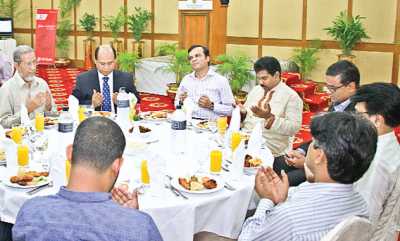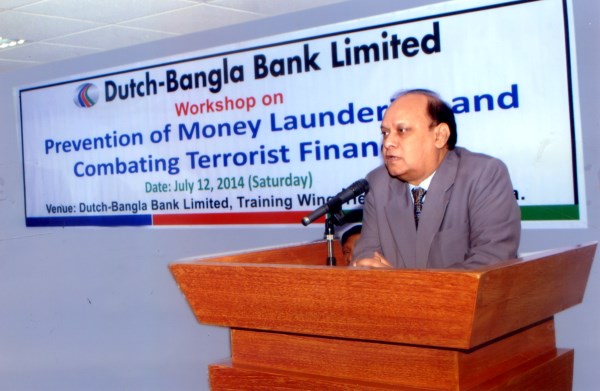Banking
AB Bank hosts Iftar for media men
 Journalists from print and electronic media and related media personnel offer prayer before Iftar mahfil arranged by AB Bank Limited at a hotel in Dhaka recently.
Journalists from print and electronic media and related media personnel offer prayer before Iftar mahfil arranged by AB Bank Limited at a hotel in Dhaka recently.
AB Bank Limited hosted an Iftar mahfil in honour of media personnel of the country at a hotel in Dhaka recently.
Journalists from print and electronic media and related media personnel were present at the Iftar Mahfil, said a press release.
High officials of the bank were also present at the Iftar Mahfil.
Moshiur Rahman Chowdhury, President and Managing Director (Current Charge) of AB Bank praised the media community for their contributions and support over the years in developing healthy banking sector in Bangladesh.
Pubali Bank holds branch managers’ conference
The 2nd Conference-2014 of Regional and Corporate Branch Managers of Pubali Bank Limited was held at the bank’s head office in Dhaka on Sunday.
Hafiz Ahmed Mazumder, Chairman, Board of Directors of the bank attended the conference as chief guest, said a press release.
Azizur Rahman, Director of the bank was present as special guest, while Helal Ahmed Chowdhury, Managing Director and CEO of the bank presided over the meeting.
Dutch-Banqla Bank organises a day-long workshop on Prevention of Money Laundering and Combating Terrorist Financing
 Dhaka-Dutch-Bangla Bank Limited organised a day-long workshop on Prevention of Money Laundering and Combating Terrorist Financing for officials of the Bank. K. S. Tabrez, Managing Director of the Bank inaugurated the workshop on Saturday held at the Bank’s Training Wing, Dhaka, reports in a press release.
Dhaka-Dutch-Bangla Bank Limited organised a day-long workshop on Prevention of Money Laundering and Combating Terrorist Financing for officials of the Bank. K. S. Tabrez, Managing Director of the Bank inaugurated the workshop on Saturday held at the Bank’s Training Wing, Dhaka, reports in a press release.
The workshop aimed at familiarizing the participants with the updated and changed aspects of Money Laundering and Terrorism Financing. Different resource persons and anti money laundering experts conducted various sessions in the workshop.
In his address, K. S. Tabrez mentioned that with the increase of economic activities and economic inclusion of greater number of peoples, more and more individuals and organizations are coming within the purview of banking services and thereby it becomes a challenge for the bankers to keep the banking institution safe from its illegal use by unscrupulous elements. He also advised the participants to exercise due caution in account opening process and strengthen transaction monitoring efforts to prevent money laundering.
Among others A.K.M Shah Alam, Executive Vice President & CAMLCO and A. H. M. Zahurul Islam, Executive Vice President, Training Wing of DBBL were presented in the workshop.
BRICS to launch bank, tighten Latin America ties
The BRICS group of emerging powers will launch its own development bank at a summit next week, using its growing influence to establish a counterweight to Western-dominated financial organizations.
Fresh from the World Cup final, Brazilian President Dilma Rousseff hosts the leaders of Russia, India, China and South Africa in Fortaleza on Tuesday before an unprecedented meeting with South American leaders the next day in Brasilia.
On the diplomatic front, the summit will mark the first face-to-face meeting between India's new Hindu nationalist Prime Minister Narendra Modi with Chinese President Xi Jiping.
For Russian President Vladimir Putin, who traveled to Cuba this week, the trip comes amid newly frayed relations with the West over the crisis in Ukraine.
The leaders, including South African President Jacob Zuma, will establish two new financial organizations: a development bank to fund infrastructure projects and a reserve fund to fend off currency and balance of payments crises.
The BRICS are "countries with enormous potential that can gain many benefits for themselves but also for a new economic and international political order," said senior Brazilian foreign ministry official Jose Alfredo Graca Lima.
Graca Lima said the bank and the reserve would "complement" the Washington-based World Bank and International Monetary Fund.
The bank will have capital of $50 billion with each country contributing $10 billion, while the reserve, which has been described as a "mini-IMF," will have $100 billion at its disposal, Graca Lima told reporters.
For the fund, China will make the biggest contribution, $41 billion, followed by $18 billion from Brazil, India and Russia and $5 billion from South Africa.
- Opposed interests -
"The BRICS want to create alternatives, a type of global monetary policy more in tune with the realities of emerging countries," Andre Perfeito, chief economist at Gradual Investimentos consultancy, told AFP.
Despite their agreement on the need for a bank, the five countries are split on where it should be headquartered.
Graca Lima said Shanghai was the frontrunner to host the bank but South Africa's Trade and Industry Minister Rob Davies said Johannesburg was still in the running. New Delhi and Moscow are the other candidates.
The five nations are also negotiating who should hold the bank's rotating presidency first. And the membership of the board of directors has yet to be decided.
The BRICS were created after economist Jim O'Neill used the acronym in 2001 to describe the growing powers. They are now seeking to break the European, US and Japanese domination of financial institutions.
Private banks raise capital base to meet global standards

Private banks are raising their capital base in every quarter to meet new international standards that will take effect next year.
Their capital base went up around 1.63 percent in the first quarter of this year, while state banks are in a weak position in maintaining capital.
Of all the commercial banks, BASIC Bank plunged into the worst financial condition due to huge irregularities.
Spiralling bad loans have widened the bank's capital shortfall to Tk 1,036 crore at the end of March.
In line with Basel II standards, banks have to maintain 10 percent capital of their risk-weighted assets.
But BASIC Bank's capital adequacy ratio (CAR) was -0.66 percent during January-March, according to central bank statistics.
Basel II was intended to create an international standard for banking regulators to control how much capital banks need to put aside to guard against financial and operational risks.
However, the condition of other state-owned commercial banks was also weak in the quarter as they maintained a CAR of 9.77 percent on average.
But the private banks have been increasing their capital base in every quarter: their CAR rose by 0.13 percentage point in the first quarter and stood at 12.39 percent.
On March 31, the private banks' total capital was Tk 49,092 crore, up from Tk 48,303 crore on December 31, 2013.
Foreign banks always maintain a higher CAR, which was 22 percent at the end of March. As the state banks' capital marked a fall in the first quarter, the overall capital of all banks decreased to Tk 64,575 crore in March from Tk 65,191 crore three months ago.
When Basel III standards will come into effect, banks will have to maintain CAR at double the present requirement, said Anis A Khan, managing director of Mutual Trust Bank, a private bank.
With the increase in lending, banks' capital requirement will go up and so they will have to raise their capital every year, he added.
If banks have a stronger capital base, they will be able to give their clients bigger amounts of loans, the demand for which will increase with the rise in business activities in the country, Khan said.
Pubali Bank Managing Director Helal Ahmed Chowdhury said the local banks can enjoy various benefits in international business if their capital base is strong.
Also, the local banks can bargain with their foreign counterparts for a cost-effective rate on charges of various services if their capital base is strong, he said.
As banks will start making preparations for Basel III standards from next year, they will have to strengthen their capital base further, Chowdhury said.
News:The Daily Star/13-July2014



